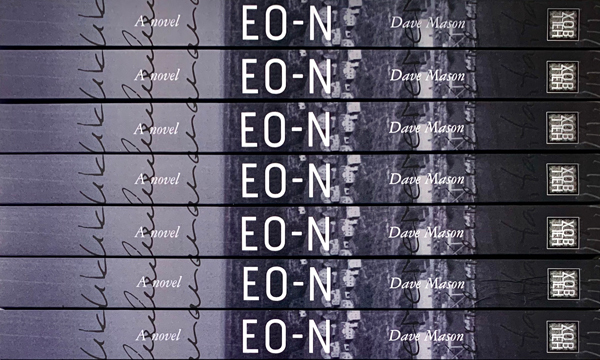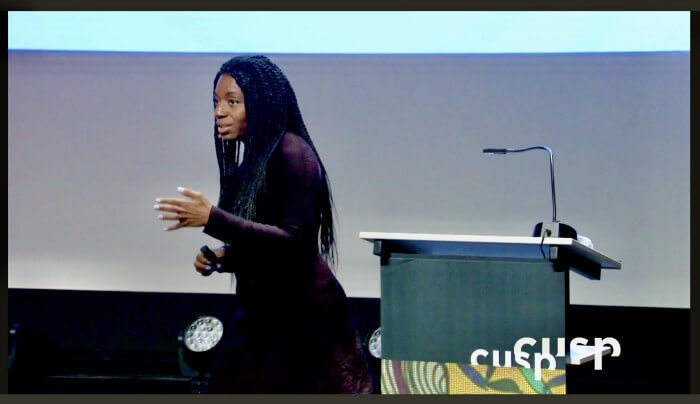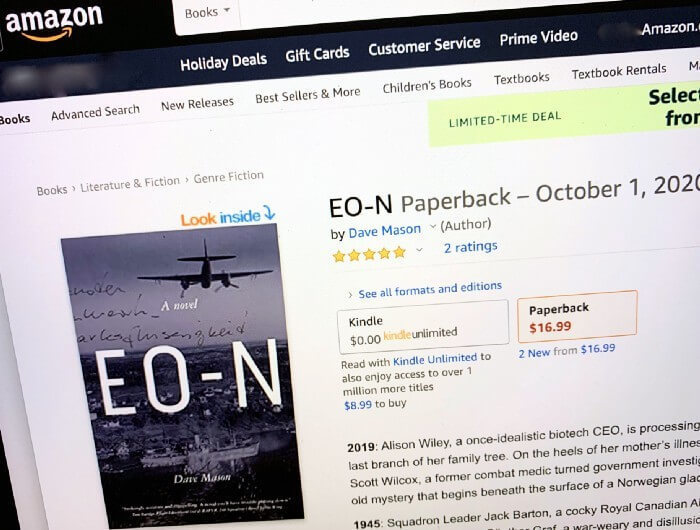The write move.
I never intended to write a novel.
In 2018 I was probably like a lot of people living in the not-so-United States: chugging along in an attempt at a positive daily life while mired in an endless flow of bad news.
I found myself stuck in a cycle, boarding a commuter train each morning and immediately submerging my brain in 45 minutes of whatever negativity my phone served up, then spending half an hour or so pissed off or frustrated or disgusted before settling down enough to do the design and strategy work I’ve loved for more than 30 years. In the evenings, I’d hit the gym, then repeat the doom-train-bad news-angry-recovery scenario on my way home. Not good.
In late October of that year, my Multiple Inc. partners Andy, Kelly, Kevin, and I hosted the eleventh and final iteration of Cusp Conference, our annual Chicago gathering “about the design of everything.”
Running and hosting a conference is not like attending a conference. Attending a conference is immersing yourself in talks by fantastic speakers who are delivering intelligence and insights that can help you move forward. Running and hosting a conference is about scheduling and technology and catering and sweating every detail so that your presenters and attendees can have a great time. I’ve learned over the years that as a conference host, it’s only possible to catch snippets of the presentations as they’re happening, but not to sweat that, because I get to see them many times later on. So it wasn’t until sometime in December of that year, during the video editing process, that I was able to actually experience a presentation that just grabbed me.
Tara-Nicholle Nelson is a self-professed impact junkie (her words) and the CEO of Transformational Consumer Insights (TCI), a strategy and customer research firm. She’s worked with organizations including HGTV, ING Direct (now Capital One), Eventbrite, and Trulia (now Zillow). But in addition to her work around brands and consumer insights, she’s all about inner wellbeing.
One of the personal wellbeing tools Tara mentioned in her Cusp talk was the power of writing — not for others, but for yourself.
Now, I write for my clients almost every day, so the kind of writing Tara was describing was pretty out there to me. Writing for the hell of it was something that hadn’t entered my mind since about third grade. But something she said just made sense at the time and I acted on it.
“Many things happen when you write every day. You get access to this incredibly powerful emotional windshield wiper.”
Boom!
On the train ride home the evening after viewing Tara’s talk, I put away my phone, opened my laptop, and started writing. I did the same thing on the train ride into Chicago the next morning. Seemed harmless enough.
Because it was for my eyes (and brain) only, it was just rambling stuff at first, random thoughts and streams of consciousness. But random is not really how my brain works, so within a few days I’d started to string together a bunch of what if’s based on news articles I’d read, NPR radio segments I’d heard, people I’d met, personal experiences gained over years in the strategic design business, and bits and pieces of information I’d remembered from somewhere. And what do you know? A few months of weekday train rides later, I’d written about 70,000 words.
At that point, I thought it might be a good idea to share this new thing with my wife. Needless to say she was a little taken aback when I told her I thought I’d written the beginnings of a novel — “What else don’t I know??” — but she read it and told me it was solid. Then again, she pretty much always tells me the stuff I do is solid, even when we both know some of it ain’t. So she suggested I share it with a few other people — the kind of people who would tell me it sucked if it sucked. My sister and brothers! Well, shit, they also thought it was solid, and they insisted I share it with a few more folks who also concurred on the solid thing. What now?
Having no clue how being a novelist actually works, I hit Google and embarked on a path that first took me into the traditional publishing world — I received positive interest from a couple of publishers but the realities of that model are illuminating, to say the least. Eventually, on the advice of a few friends who are published authors, and with the tentative agreement of my inner control freak/designer, I dived headfirst into the fascinating mechanism of self-publishing.
So here I am. In my first week as a published historical fiction novelist.
And I can honestly say that Tara was 100% right.
The process was engaging, therapeutic, and invigorating in ways I never would have expected. The research aspects alone were amazing. I connected with forensic anthropologists and aircraft restoration experts, and I’ve been fortunate to spend time in the company of a couple of 95+ year-olds who did incredibly courageous things as shockingly young men. Working with an experienced, pull-no-punches fiction editor and insightful beta-readers has been a great experience, and has added a whole new set of words to my personal lexicon. And maybe it’s the control freak in me, but creating and giving life to fictional characters is weirdly satisfying. I found myself looking forward to those train rides, and energized by the process of creativity for the sake of creativity.
Tara talked about getting into and staying in “the flow state” — something she describes as moments of “intense joyous focus.” I’ve been fortunate to work in a creative career that’s put me into that state countless times. But the train rides to and from that career were getting to me. It was the bombardment with negative things over which I had no control that I needed to eliminate. Writing what turned out to be a novel most definitely put me in the flow state, and yeah, that’s a great place to be.
I’m not advocating novel-writing for everyone. Maybe gardening or baking bread or painting or restoring old cars is more for you. But right now, in an even more tumultuous time, it seems clear that we’re in even greater need of people in the positive flow state than we were in 2018.
So maybe try doing something out of the ordinary for yourself, because whatever it is that gets you feeling like things just might be okay just might help us all make things a little more okay.


